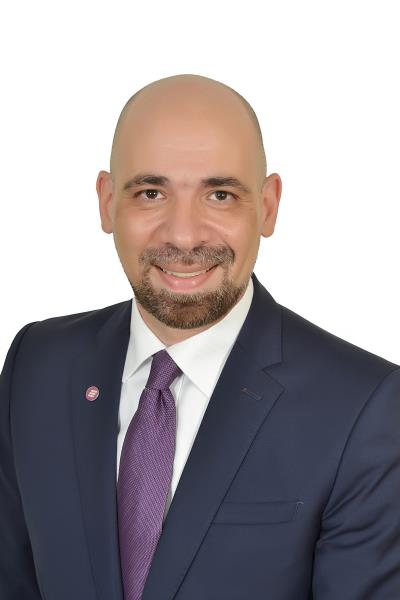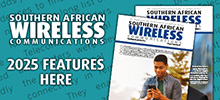16 October 2023
Hossam Kandeel - Ericsson: Vice President, Head of Global Customer Unit MTN and Customer Unit MTN Africa at Ericsson Middle East & Africa
Africa's communications sector has undergone significant transformation over the past two decades, marked by significant expansion of the telecommunications infrastructure which includes the development of mobile networks and increased internet connectivity. Africa has also witnessed a surge in the adoption of affordable mobile phones, even in many rural areas. A report by GSMA Intelligence found that Sub-Saharan Africa (SSA) will be one of the key regions to witness the biggest increase in smartphone adoption of 87% by 2030. This has also led to the availability of affordable internet, including 3G, 4G, and emerging 5G technologies. Finally, the region has also been witnessing rapid development of mobile payment systems which have enabled millions of Africans to access communication and financial services.
Governments across the continent continue to implement regulatory reforms to encourage investment in the telecommunications sector and promote competition within the region. Early recognition of this rapid growth allowed Ericsson to be present in Africa for over 100 years. We have built the wireless networks for every generation – from the early 1G networks to the first advanced 5G networks and continue to contribute to the region’s future for connectivity and digital access. The continued growth of affordable internet technologies further is sure to cement Africa's position on the global communication landscape.
How can rural Africa gain high-speed connectivity sustainably?
To attain sustainable high-speed connectivity in rural Africa, we need an approach founded on technological advancements and cross-industry collaboration. Ericsson is continuously innovating to increase efficiency of investment, deployment and operation of sites in rural Africa. Through global cooperation and digital innovation, ICT solutions have the potential to decrease global carbon emissions by up to 15% by 2030.
At Ericsson, we believe that ICT possesses a unique potential to facilitate the transition of other industrial sectors towards a low-carbon economy. Emerging technologies like 5G, AI, and IoT serve as critical tools for decarbonization efforts.
We are committed to assisting service providers in overcoming the energy challenge by developing innovative solutions capable of meeting present and future network requirements while addressing energy consumption, expenses, and carbon emissions. In 2022, Ericsson accomplished a 39% reduction in energy usage compared to the legacy portfolio when delivering Ericsson Radio System radios (44% if Micro Sleep Tx functionality is included), surpassing the company's science-based target of 35%.
One of our solutions is intelligent RAN energy-saving software, which has already demonstrated significant energy reductions. Furthermore, our triple-band, tri-sector 4G/5G radio technology consolidates the work of nine radios, resulting in reduced energy consumption and embodied carbon emissions.
Through our Ericsson Rural Sites solution, we collaborate with partners to extend connectivity to regions lacking access. This solution integrates solar panels and batteries as alternative and environmentally friendly power sources, decreasing reliance on traditional energy sources and ensuring uninterrupted service in remote areas.
Furthermore, waste reduction plays a crucial role in promoting a circular economy. We believe in smart product design that encompasses core product design, sustainable packaging materials, and environmentally friendly transportation. Rather than focusing solely on waste, we encourage businesses to adopt a comprehensive circular economy approach and seek like-minded partners.
Ericsson actively addresses the issue of e-waste and supports others in doing the same. We initiated a global Product Take-Back Program in 2005, implementing a comprehensive product design approach that includes responsible material selection and efficient resource utilization. At the end of a product's life cycle, we offer customers a complete take-back service, including secure data destruction. In Africa, we have decommissioned equipment at no cost for over 40 customers, spanning 28 countries across the continent. Approximately 8,271 tons of waste electronic and electrical equipment have been successfully recycled since January 2012, with Africa hosting two of Ericsson's globally approved recyclers. Additionally, we are enhancing supply chain resilience and reducing transport emissions by leveraging Ericsson's global capabilities and presence to ensure responsiveness and flexibility.
Which African nations hold the most opportunity for Ericsson right now, and what moves is the company making there?
The continent is the home of thriving businesses including telecommunications. We have been active in several African countries due to the continent's growing telecommunications and technology markets. We launched #AfricainMotion to help the continent connect and develop sustainably. Our promise is to support a world where technology is changing things, helping Africa grow, create jobs, and improve lives.
We are working with various network providers across the region to ensure 4G expansions and 5G introduction and growth through the modernization of Radio Access Network (RAN), microwave transport infrastructure, and mobile core network. Our introduction of future-proof solutions from the Ericsson RAN portfolio, not only delivers faster and more reliable mobile services, but also reduces network energy consumption, thereby enhancing the overall 5G ecosystem. 5G has better spectral efficiency in capturing very high data traffics that we see in several African countries. We have also innovated dynamic spectrum sharing to enable cost-efficient, wide-area 5G coverage by allowing users to dynamically switch between 5G and 4G coverage on existing 4G assets.
Recently, we also cemented our commitment to lead in Open RAN (open radio access network) technology, which will make mobile networks more flexible and programmable. This advancement marks a significant step toward fully programmable mobile networks and sets the stage for a massive revolution in the future of mobile communications.
What is Ericsson’s approach to ESG in Africa?
We are committed to ESG and have set targets aligned with our company strategy, covering both our own operations and impacts across our value chain. We believe that diverse, inclusive teams drive performance and innovation, creating greater business value. We are already on track to achieve our goal to have 30% women in our total workforce, among line managers, and in the executive population by 2030.
Sustainability and responsible business practices are at the core of Ericsson's strategy and corporate culture. We are dedicated to conducting responsible business and providing solutions to address the growing environmental issues. Our objective is to achieve carbon neutrality in our own operations by 2030, and our 2022 Sustainability Report demonstrates our progress toward this goal. In 2022, Ericsson not only met but exceeded its SBTi-verified target, reducing emissions from our own activities by 60% compared to the 2016 baseline, surpassing the 35% target set for 2022.
We have been focused on achieving our targets through meaningful collaborations across Africa. We recently established a partnership with SkyMax Network Limited to create an advanced 5G broadband network spanning across SSA. Our collaborations with Telma and Airtel Niger involved the deployment of our dual-band, three-sector Radio technology to deliver a 5G-ready and more energy-efficient network. Additionally, we brought our Ericsson Product Take-Back Program to Africa through our partnership with MTN Benin, where we recycle MTN Benin's end-of-life electronic and electrical equipment. This partnership has resulted in the collection, decommissioning, transportation, and recycling of over 123 metric tons of waste electrical and electronic equipment (WEEE) since 2021.
On the digital and social front, Ericsson's commitment to bridging the digital educational divide embodies our vision to empower future generations with the tools they need to thrive in an increasingly digital world. Through concerted effort, Ericsson is catalyzing positive change, nurturing a brighter, more inclusive educational landscape, and contributing to the betterment of societies around the globe.
An Economist Intelligence Unit (EIU) report sponsored by Ericsson indicated how improving school connectivity can benefit society at a macroeconomic level. In the context of West Africa, taking Niger as an example, the report finds that improvements in school connectivity to Finnish levels could increase GDP per capita by almost 20%, from US$550 per person in the baseline to US$660 per person by 2025.
We are currently working on a project to implement Fixed Wireless Access (FWA) connectivity solutions in five schools in Senegal, along with devices, software, content, and training to support the development of a digital education ecosystem. As millions continue to wait for reliable home broadband, fixed wireless access (FWA) presents an efficient and scalable alternative to wired connections. Our studies show that with smart and targeted deployments, the investment typically pays off in less than two years.
We firmly believe that sustainability is at the foundation of our business success. Our aim is to generate value for the future, and we are confident that our long-term success will benefit all our stakeholders, including customers, employees, partners, and shareholders.
Which Ericsson partnerships have made the biggest impact on bridging the digital divide in 2023?
Our commitment towards Africa is to support a world where digitalization enables economic development and provides limitless connectivity for all. We have partnered with several operators in the region to help meet the growing consumer demands for mobile broadband connectivity, and all our partnerships have played a significant role in enhancing this vision.
As Africa enters the digital age, having strong digital skills is essential. Currently, many in the workforce don't have these skills, and newcomers need expertise in Industry 4.0. Given that digital technologies are driving entrepreneurship, it's important to emphasize vocational and hands-on skills for economic growth. That's why we are committed to initiatives that promote digital literacy.
Through the GIGA initiative with UNICEF, we are helping bridge the connectivity gaps by mapping school connectivity with the goal of connecting over 2.1 million schools. With the support of Ericsson and other partners, 2,100,000 school locations in 138 countries, including 11 in Africa, have been mapped, and more than 5,000 schools have been connected by Giga worldwide.
Our 'Connect to Learn' initiative empowers educators and students for modern education, and it is complemented by graduate programs in Africa. This program is also addressing the gender gap in STEM fields, where only 35% of people in higher education are female. Through this initiative we encourage girls in ICT careers by supporting the education of women and girls across the region. We have also partnered with Free in Senegal (part of Axian Group) to provide under-resourced schools in Senegal access to meaningful connectivity using Fixed Wireless Access (FWA) technology. We are pleased to have renewed our partnership with WPDI, extending how we support peacebuilding through youth education to more countries in Africa.
We also launched the Ericsson Graduate Program in Africa, which is designed to enhance the technical skills of graduates. This program provides comprehensive training on Ericsson's technology, solutions, and delivery methods, as well as an in-depth understanding of Ericsson's processes, tools, and methodologies.
We have also extended our global skills program to Africa in cooperation with the Smart Africa Digital Academy. This collaboration aims to offer digital upskilling opportunities to 100 policymakers and regulators from 19 African nations. The program focused on emerging technologies, fostering digital transformation across Africa through education and capacity building.
What are your expectations for Africa in 2024 and beyond?
In the coming years, we will witness the emergence of new technologies driving the future of mobile networks in Africa. These technologies will encourage connectivity, bridge gaps, and lead the digital revolution within the region. Connectivity will remain a key contributor to the continent's growing economy, with the expansion of 5G and 4G networks serving as catalysts for innovation, connection, and opportunities.
At Ericsson, our aim is to play a role in extending affordable broadband access to the people of Africa, reducing the digital divide, enabling them to fully embrace the benefits of the digital economy, and supporting the achievement of the UN's Sustainable Development Goals (SDGs). Furthermore, we will continue to leverage digital technology to promote financial inclusion, a critical aspect of advancing economic development throughout the continent.






